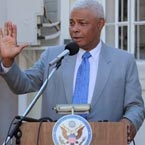
United States ambassador to Zimbabwe, Charles Ray (CR) will soon leave Zimbabwe after a three-year tour of duty. Ray is retiring from the diplomatic service after 30 years, preceded by 20 years as a soldier. The Standard Political Editor, Patrice Makova (PM) last week had a wide-ranging interview with him on the US policy on Zimbabwe and other issues.
PM: Three years after your posting in Zimbabwe, do you feel you have achieved most of your objectives?
CR: The most significant thing is that a lot of useless rhetoric of the past is now gone. We are now able to discuss issues of substance in a gentlemanly and civilised way. That might not be much but it’s the essence of what diplomacy is all about, creating an environment where real issues can be discussed.
PM: Have economic relations between Zimbabwe and the US improved during the past three years?
CR: The US provides a significant amount of humanitarian assistance, more now than before to address issues like HIV and Aids, malaria and so on. We will continue to do that as long as it’s necessary, although the desired objective is to create capacity for the Zimbabwean government to be able to be on its own. Year-on-year economic trade has increased for the last nine years with Zimbabwe running a trade surplus. Zimbabwe and US commercial relations date back to over 100 years ago. There are a number of American investors who have expressed a lot of interest in Zimbabwe because they see incredible potential, but until the political risk factor is addressed, that potential will not be realised.
PM: Is the Indigenisation Act one of the policies making American investors hesitant? CR: The Indigenisation Act itself is not an issue. A lot of countries in South East Asia have that kind of legislation, including China which has domestic co-production requirements. It’s not the law that bothers the people, but the lack of transparency surrounding the implementation of that law. I have no problem if I know before coming to Zimbabwe that I will have to find a willing and capable local partner who will bring in 51% of the investment capital. Where investors have problems is when they sign a contract and six months later somebody comes up and says this is not the way, here is how it is going to be.
PM: Do you think it is possible for Zimbabwe to hold credible elections this year? CR: This is for Zimbabweans to decide, but certain things have to be in place for credible elections to take place. These include freedom of the media and absence of political violence, intimidation, coercion and a legal basis such as a constitution that everyone accepts, a clean voter’s roll, understood and delimitated constituencies. Mechanisms must be put in place to independently monitor the vote before, during and after election. As long as elections are peaceful and transparently conducted and the vote is respected, then the international community will accept the results. PM: The US and other Western countries are said to be pushing for an academic to replace PM Morgan Tsvangirai as the leader of the MDC. How far true is this? CR: I don’t know where this started. The US government is not pushing for any individual. We are not betting on any horse in the race here. We are just trying to help people here to build a race track for all the horses to race. PM: What of accusations that the US is funding the MDC-T? CR: We do not fund the party. People must distinguish between individuals in the US and the government. What the US government supports is a process of credible elections and the respect of the will of the people.
- Chamisa under fire over US$120K donation
- Mavhunga puts DeMbare into Chibuku quarterfinals
- Pension funds bet on Cabora Bassa oilfields
- Councils defy govt fire tender directive
Keep Reading
PM: You came just after the formation of the GNU, what do you think of the direction the country is taking? CR: Most people would like to see Zimbabwe go a lot faster and further than it has done now. There is still politically-motivated violence. There are still far too many restrictions on the political and media spaces. There is also still little respect on individual dignity and human rights. The economy is much more stable, although static at times. The government should now work on the policies that promote job creation and growth of the economy. PM: Do you think it is possible for the US government to re-engage President Mugabe in the near future? CR: I have been engaging Mugabe since I presented my credentials. I see my successor possibly continuing with that. PM: What was your impression of Mugabe the last time you met him? CR: He was alert and engaging. I am always impressed by his mastery of tonnes of dates and data. We spend a lot of time talking about the things we are trying to do to help the people of Zimbabwe and improve the investment climate. PM: Finance minister, Tendai Biti recently said your government promised to remove Marange resources and Mbada diamonds from the sanctions list? CR: I am not sure whether this is accurate. The two diamond companies were listed by the Treasury department because they are 50% or more owned by an entity already listed. As long as the ownership issue remains like that, there is nothing that the State department can do about that. PM: As an ex-soldier yourself, what do you think of our securocrats dabbling in politics? CR: They have a right to exercise personal political views. However, when senior military officers use their office to express political views and align themselves with a faction rather than the whole country, they cease to be professional.











